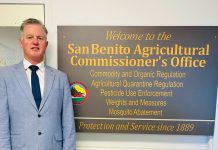The San Benito County Board of Supervisors decided against implementing a change to the Williamson Act that would have brought in $230,000 in revenue to the county coffers while decreasing property tax savings by 10 percent for rural landowners who have contracts within the provision that allows for discounted tax rates in prime agricultural regions.
County Assessor Tom Slavich presented to the board how Assembly Bill 1265 would affect the county, in which 65 percent of the property is part of Williamson Act contracts. He asked supervisors to set a public hearing for Dec. 20 if they were interested in pursuing the implementation of the program. As the discussion progressed, the majority of supervisors made it clear that they weren’t interested in pursuing the changes to the Williamson Act and that a public hearing would not be necessary.
The bill changes the contracts for the Williamson Act from 10 years to nine years and requires the property owners to give up 10 percent of the tax savings for counties that opt into it.
“We don’t have to initiate it,” Slavich said.
Instead of implementing the changes, Supervisor Jerry Muenzer asked if they could look into approaching the state about using conservation funding to cover the cost of Williamson Act contracts. He said he thought there was a state wildlife conservation fund that had a significant amount of money in it. He argued that the Williamson Act was started as a measure to conserve agricultural land so it would make sense to use such funding to preserve the contracts.
“We are inundated by groups that come before us …” he said, of conservation organizations. “They talk about how ranchers and cattlemen are great conservationists.”
He asked if Supervisor Anthony Botelho could present the idea at a Regional Council of Rural Counties board meeting this week.
“The ranchers I’ve talked to said that 10 percent (less savings) would be harmful to them,” said Muenzer, whose district includes south San Benito County. “So many are right at the breaking point.”
Botelho approved of the idea of talking with the RCRC group about conservation funds and was against cutting the tax savings to agricultural landowners.
“All this is, is having us, the county, act as the bad guy,” Botelho said. “We (would) have to raise property taxes on a segment of the population that doesn’t need it. It’s one thing after another … The state has reneged on supporting counties.”
Botelho agreed with Muenzer that the change would hurt local families.
“It would provide revenue, but it is taking that revenue from folks who have the least resources,” he said.
Margie Barrios was the only supervisor who supported a public hearing to bring the issue to residents.
“I agree with what was said,” she said. “You cannot balance the budget on one group. But keep in mind we are going to have to balance it on others.”
She brought up the need to cut the budget more in the coming year, suggesting that the 2012-13 budget might have to be reduced by an additional $4 million. She mentioned layoffs to staff and cuts in services for the current fiscal year.
“Everyone should pay a small portion,” she said. “For ranchers and farmers it’s not small, but it’s not small for the person losing a job.”
Three years ago, state officials made changes to the Williamson Act that eliminated a subvention fund that helped restore some of the property taxes lost in counties with agricultural areas. The state stopped returning $761,000 to the county to cover the cost of lost property taxes for those properties with Williamson Act contracts. At that time, the county stopped accepting new applications for Williamson Act contracts.
The state offered AB 1265 in July as an option to counties to help collect back a portion of that funding directly from property owners. The bill is similar to a Senate Bill 863, approved in 2010, which San Benito’s supervisors opted out of last December. That bill was repealed in March and replaced with the assembly bill.









